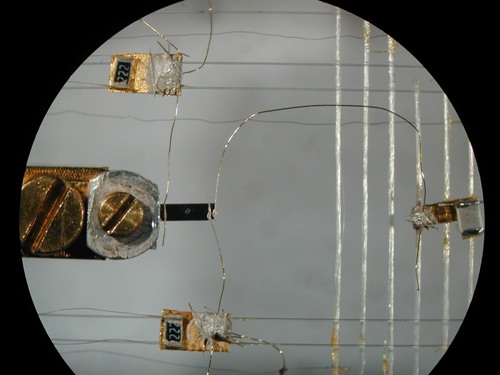A team of physicists from the Rice University, University of California, Los Angeles, and two Max Planck Institutes in Germany has discovered that electrons violate Landau-Fermi liquid theory only at quantum critical points (QCPs) but behave as explained by the theory on either side of a QCP.
 This microscope image shows thermometers (top and bottom) and a heater (right) connected via 50-micrometer-wide gold wires to a black rectangle of the ytterbium dirhodium disilicide (center) that is only three-quarters of a millimeter wide. Using this setup, researchers at the Max Planck Institute for Chemical Physics of Solids in Dresden, Germany, induced a thermal current by setting up a small difference in temperature at the two ends of the sample. The proportionality coefficient between this temperature difference and the thermal power provided by the heater defined the thermal conductivity of the sample, which was found to violate traditional laws of physics when the material was cooled to a "quantum critical point." (CREDIT: Heike Pfau/Max Planck Institute, Dresden)
This microscope image shows thermometers (top and bottom) and a heater (right) connected via 50-micrometer-wide gold wires to a black rectangle of the ytterbium dirhodium disilicide (center) that is only three-quarters of a millimeter wide. Using this setup, researchers at the Max Planck Institute for Chemical Physics of Solids in Dresden, Germany, induced a thermal current by setting up a small difference in temperature at the two ends of the sample. The proportionality coefficient between this temperature difference and the thermal power provided by the heater defined the thermal conductivity of the sample, which was found to violate traditional laws of physics when the material was cooled to a "quantum critical point." (CREDIT: Heike Pfau/Max Planck Institute, Dresden)
Qimiao Si, one of the researchers, stated that events occurring at the QCP decide the interaction of electrons in a material. Using Landau-Fermi liquid theory, scientists can explain the interactions of electrons in a material with fewer variables.
The team studied ytterbium dirhodium disilicide, a heavy-fermion metal that has many resemblances to high-temperature superconductors and has accurate atomic organization of rare earth metals and transition metals. Existing theories that explain electron interactions in conventional semiconductors and metals are not able to describe heavy-fermion metals’ unusual electronic properties.
During the study, the research team explored various physical properties at ultralow temperatures to demonstrate the failure of basic tenets of Landau-Fermi liquid theory at the QCP. Frank Steglich explained that the team discovered a breakdown in the theory by calculating the thermal to electrical conductivity ratio close to the QCP.
Landau's vehicle for ending the actions of numerous particles is termed as ‘quasiparticle’. A quasiparticle behaves like a single particle but represents the collective fate of several physical particles. From the thermal to electrical conductivity ratio measured, the team discovered that thermal conductivity of quasiparticles was 10% lesser than the predicted value. From the findings, the research team demonstrated that the deviation from the expected value happened only at the QCP.
These results were also in line with a theory proposed by Si and his colleagues in 2001 to describe the correlated behavior of electrons at the QCP. Quantum fluctuations induced by magnetism at the QCP are the reason behind the unusual electronic properties demonstrated by these heavy-fermion metals and they are also significant in other exotic materials such as high-temperature superconductors.
According to Stefan Kirchner, one of the researchers, the findings demonstrated that the breakdown of conventional electron arrangement happens at the QCP.